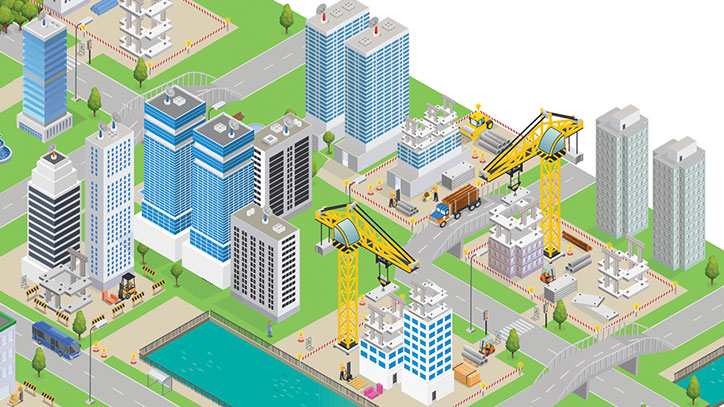As one of the traditional industries in Hong Kong, the construction sector has been transformed with the adoption of innovative technologies and processes to boost efficiency, tackle manpower shortage and enable smarter management.
Driven by mega infrastructure projects, public and private housing developments in Hong Kong, the construction industry has been booming in recent years. Despite the boom, the construction sector faces a number of challenges such as lack of skilled labor, tight construction project schedules and the push for sustainable and green development.
Innovative technologies and modern construction methods are increasingly implemented in the industry such as modular and prefabrication construction, Building Information Modelling (BIM), construction automation and robotics, smart sensors and data analytics. They enable the construction sector to become smarter and sustainable.
To alleviate housing supply problem, modular and prefabrication construction has been actively adopted in public housing building. This construction method has also been extended to dormitories for students and employees. Another technology BIM, which has been deployed for decades, is now integrated with GIS or RFID technologies for enhanced housing site planning and production efficiency particularly for prefabrication housing.
Construction automation and robotics are rapidly developed in the past few years. According to a robotics and automation consultancy report released by Construction Industry Council this June, façade work is the top priority in implementing automation and robotics, followed by interior painting and plastering, and hoisting and tower crane. These labor-intensive or hazardous tasks can be carried out by robotics in housing construction for improving productivity, quality of work and safety.
Smart sensors and advanced data analytics enable smart building construction in areas like predictive maintenance, energy efficiency and enhanced security.
Apart from the above advanced technologies and processes, project management information system (PMIS) is also crucial in construction works or pilot projects. Construction costs, progress and quality can be tracked and monitored through digital dashboards.
PMIS is considered an important building block of projects. It helps companies in the construction sector to manage and execute projects effectively and efficiently.
An example of PMIS is FlexSystem’s FESA Project Management. It offers an integrated platform to manage project elements from contracts, requisitions, changes and payments. It also provides real-time insights into the control and forecast of project costs. As a result, it helps companies improve productivity, reduce project risk and gain full visibility on project schedule and budget.
Forward-thinking companies that make the right investments in advanced technologies and processes are able to thrive and stay ahead in the local and global construction environments for now and in the future.


